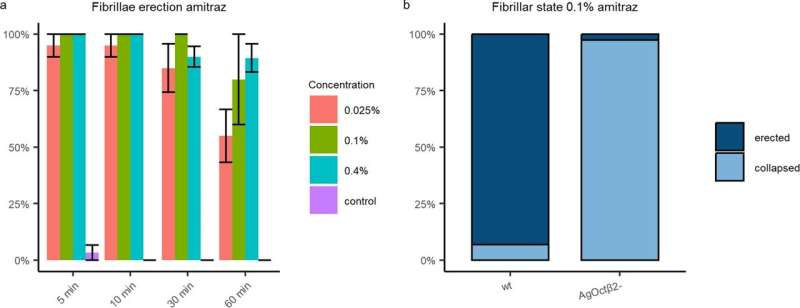This article has been reviewed according to Science X's editorial process and policies. Editors have highlighted the following attributes while ensuring the content's credibility:
fact-checked
peer-reviewed publication
trusted source
proofread
Mosquito hearing could be targeted by insecticides

Specific receptors in the ears of mosquitoes have been revealed to modulate their hearing, finds a new study led by researchers at UCL and University of Oldenburg.
Scientists say, this discovery could help develop new insecticides and control the spread of harmful diseases, such as malaria.
The ability of male mosquitoes to hear female mosquitoes is a crucial requirement for their reproduction. As a result, the finding could help develop novel insecticides or mating disruptors to prevent mosquito-borne diseases like malaria, dengue, and yellow fever
In the study, published in Nature Communications, the researchers focused on a signaling pathway involving a molecule called octopamine. They demonstrated that it is key for mosquito hearing and mating partner detection, and so is a potential new target for mosquito control.
Male mosquitoes acoustically detect the buzz generated by females within large swarms that form transiently at dusk.
As swarms are potentially noisy, mosquitoes have developed highly sophisticated ears to detect the faint flight tone of females amid hundreds of mosquitoes flying together.
However, the molecular mechanisms by which mosquito males "sharpen their ears" to respond to female flight tones during swarm time have been largely unknown.
The researchers looked at the expression of genes in the mosquito ear and found that an octopamine receptor specifically peaks in the male mosquito ear when mosquitoes swarm.
The study found that octopamine affects mosquito hearing on multiple levels. It modulates the frequency tuning and stiffness of the sound receiver in the male ear, and also controls other mechanical changes to boost the detection of the female.
The researchers demonstrated that the octopaminergic system in the mosquito ear can be targeted by insecticides.
Mosquito mating is a bottleneck for mosquito survival, so identifying new targets to disrupt it is key to controlling disease-transmitting mosquito populations.
Co-lead author, Dr. Marta Andrés (UCL Ear Institute) said, "Octopamine receptors are of particular interest as they are highly suitable for insecticide development. We plan to use these findings to develop novel molecules to develop mating disruptors for malaria mosquitoes.
"Because mosquito hearing is required for mosquito mating, it can be targeted to disrupt mosquito reproduction. And increased knowledge of mosquito auditory neurosciences could lead to the development of mosquito mating disruptors for mosquito control."
Co-lead author, Professor Joerg Albert (UCL Ear Institute and University of Oldenburg) said, "The molecular and mechanistic complexity of mosquito hearing is truly remarkable. With the identification of an octopamine pathway we are just beginning to scratch the outer surface of the tip of an iceberg.
"Future studies will without doubt deliver deeper insights into how mosquito hearing works and also provide us with novel opportunities to control mosquito populations and reduce human disease."
More information: Marcos Georgiades et al, Hearing of malaria mosquitoes is modulated by a beta-adrenergic-like octopamine receptor which serves as insecticide target, Nature Communications (2023). DOI: 10.1038/s41467-023-40029-y
Journal information: Nature Communications
Provided by University College London



















